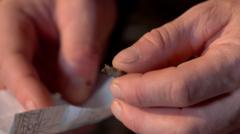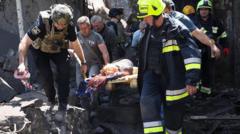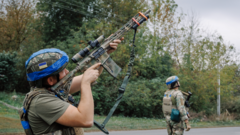Ukrainian doctors are utilizing magnet-tipped devices to successfully remove shrapnel from soldiers' bodies, addressing the urgent need for advanced medical solutions amid rising drone warfare injuries.
**Life-Saving Magnets: Innovations in Ukraine’s Battlefield Medicine**

**Life-Saving Magnets: Innovations in Ukraine’s Battlefield Medicine**
New magnetic technology is transforming the way battlefield injuries are treated in Ukraine.
In the midst of a grueling ground conflict, the innovative use of magnets in medical procedures is changing the landscape of battlefield medicine in Ukraine. This shift is chiefly illustrated by the story of Serhiy Melnyk, a Ukrainian serviceman who recently survived a life-threatening injury caused by shrapnel lodged in his heart. The advent of drone warfare has escalated instances of complex shrapnel wounds, with medical personnel reporting shrapnel injuries accounting for approximately 80% of battlefield trauma.
Serhiy recalls his violent encounter, illustrating how a small, rusty shard, initially mistaken for minor discomfort, turned out to be a deadly fragment that had pierced vital organs. Fortunately, skilled cardiovascular surgeon Serhiy Maksymenko, part of a pioneering team, utilized a groundbreaking magnetic extractor to safely remove the lodged shrapnel without causing additional harm. This device represents a significant step forward in treating injuries efficiently and effectively during the chaos of war.
These magnetic extractors, while not new in concept, have been modernized for contemporary medical use thanks to Oleh Bykov, a former lawyer turned volunteer medic. The evolution of this technology highlighted the dire need for minimally invasive methods among frontline medical teams dealing with extreme injuries. Dr. Maksymenko's team has reportedly performed over 70 heart surgeries using this device in a short span, reflecting its efficacy in saving lives.
The story behind the development of the magnetic extractor resonates with historical innovations born from conflict. David Nott, a seasoned war medic, underscores that the needs of war often spark advancements that are overlooked in civilian contexts. The magnetic extractor is proving vital in locating and addressing shrapnel injuries quickly, reducing the risks that come with traditional surgical methods.
Despite broader implications, the devices lack official certification from the Ukrainian Health Ministry, which typically regulates medical equipment. However, exceptions can be made in times of war, granting leeway for medical innovations to mitigate delays that could cost lives. The urgency of battlefield conditions often outweighs bureaucratic processes, as Oleh emphasizes the need for immediate action to save lives.
For many families, the impact of this life-saving technology is profound. Serhiy’s spouse, Yulia, expresses heartfelt gratitude for the advancements that ensured her husband returned home safely. As Ukraine continues to confront the horrors of war, the fusion of ingenuity and necessity stands out as a beacon of hope for both medical teams and injured servicemen alike.
Serhiy recalls his violent encounter, illustrating how a small, rusty shard, initially mistaken for minor discomfort, turned out to be a deadly fragment that had pierced vital organs. Fortunately, skilled cardiovascular surgeon Serhiy Maksymenko, part of a pioneering team, utilized a groundbreaking magnetic extractor to safely remove the lodged shrapnel without causing additional harm. This device represents a significant step forward in treating injuries efficiently and effectively during the chaos of war.
These magnetic extractors, while not new in concept, have been modernized for contemporary medical use thanks to Oleh Bykov, a former lawyer turned volunteer medic. The evolution of this technology highlighted the dire need for minimally invasive methods among frontline medical teams dealing with extreme injuries. Dr. Maksymenko's team has reportedly performed over 70 heart surgeries using this device in a short span, reflecting its efficacy in saving lives.
The story behind the development of the magnetic extractor resonates with historical innovations born from conflict. David Nott, a seasoned war medic, underscores that the needs of war often spark advancements that are overlooked in civilian contexts. The magnetic extractor is proving vital in locating and addressing shrapnel injuries quickly, reducing the risks that come with traditional surgical methods.
Despite broader implications, the devices lack official certification from the Ukrainian Health Ministry, which typically regulates medical equipment. However, exceptions can be made in times of war, granting leeway for medical innovations to mitigate delays that could cost lives. The urgency of battlefield conditions often outweighs bureaucratic processes, as Oleh emphasizes the need for immediate action to save lives.
For many families, the impact of this life-saving technology is profound. Serhiy’s spouse, Yulia, expresses heartfelt gratitude for the advancements that ensured her husband returned home safely. As Ukraine continues to confront the horrors of war, the fusion of ingenuity and necessity stands out as a beacon of hope for both medical teams and injured servicemen alike.





















